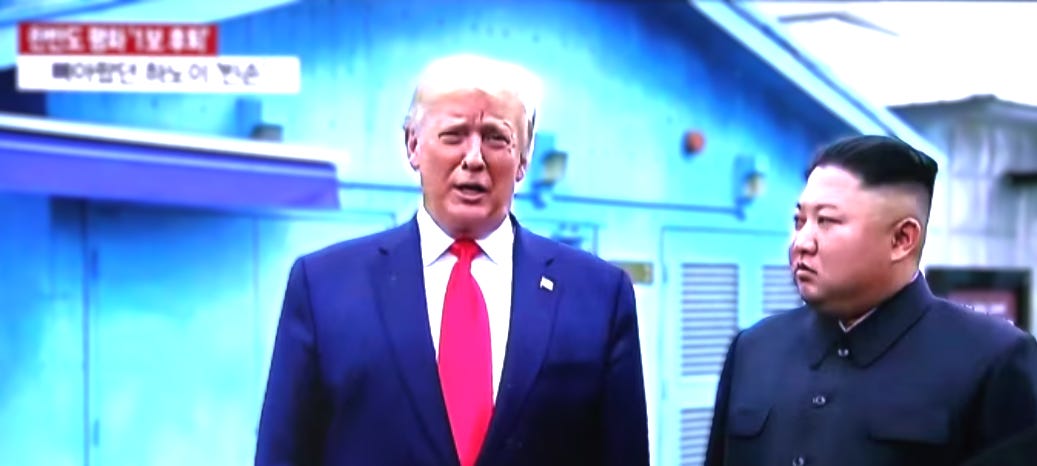An irrational pursuit of nuclear weapons?
The Washington Declaration will sooner or later become irrelevant because it doesn’t address the behavioral justifications in the pursuit of nuclear weapons.
Attempts to explain South Korea’s growing desire to pursue nuclear weapons often seek to provide rational explanations. They point to North Korea’s advances in nuclear and missile technology; China’s rise; and the fear of abandonment under a Trump presidency.
Rational explanations use causal inferences with the tacit assumption that were such threats removed, South Korea would no longer seek nuclear weapons. But we know that human beings act irrationally. Behavioral issues are just as important. South Korea’s reasons for seeking nuclear weapons are not just rational - they’re also behavioral.
The Washington Declaration of 26 April 2023 addresses the core concerns that proponents in South Korea use to justify the pursuit of nuclear weapons. It provides for the establishment of a Nuclear Consultative Group (NCG) to discuss extended deterrence, and nuclear and strategic planning, and reaffirms that any nuclear attack by the DPRK against the ROK would be met with a “swift, overwhelming and decisive response”. The subsequent meetings of the NCG and the closer alliance coordination have gone a long way to assuage South Korea’s concerns regarding North Korea’s nuclear and missile programs.
Implicitly, and through think tank and 1.5-track dialogue, it also addresses South Korea’s concerns regarding China. Additionally, the US facilitated South Korea’s integration into broader diplomatic and strategic networks. This includes the North Atlantic Treaty Organization (NATO) increased cooperation with Indo-Pacific partners through the Asia Pacific Partners or AP4 network, closer cooperation with Japan, and other regional minilateral dialogues.
Finally, the Biden and Yoon administrations have taken steps to “Trump proof” the alliance to address abandonment concerns. The two sides commenced negotiations ahead of time for the Special Measures Agreement (SMA) that provides for Korea’s contribution to United States Forces Korea (USFK) funding in the hope that an incoming Trump Administration would not seek a further renegotiation. The Biden Administration also secured a statement supporting the maintenance of troop levels in Korea in a passage of the National Defense Authorization Act, the annual federal legislation funding and authorizing the missions and critical defense priorities of the US military.
North Korea: Washington Declaration; NCG; alliance.
China: Alliance; NATO AP4; minilateralism; bilateral engagement.
Abandonment: Institutionalization; “Trump proofing”; congressional processes.
By addressing the perceived threats of North Korea, China, and abandonment, there is no rational justification for South Korea to pursue nuclear weapons. Only less rational justifications.
The problem is that there are multiple less rational justifications to pursue nuclear weapons. These include the array of human behaviors and emotions at both the individual and group (political) level. In the context of South Korea they include three particularly powerful motivations: fear, pride, and opportunism.
Fear. The sense of vulnerability and the belief that South Korea is a small, vulnerable state surrounded by predatory larger states, is part of the South Korean (and arguably North Korean) national consciousness. It pervades academic thought, public opinion, political decision-making, and policymaking.
Pride. The sense that South Korea deserves to be treated the same as Japan and other Permanent Five (P5) states is rarely considered as a motivation to pursue nuclear weapons. Under bilateral agreements, the US allows Japan to undertake reprocessing - a high proliferation risk step in the nuclear cycle; it does not allow South Korea to do so. In the same way, South Korea today has an economy and place in the global economy that places it next to France or the UK. Naturally, the public wonders why these states should possess nuclear weapons, when South Korea, which stands face-to-face with more imminent threats, cannot.
Opportunism. The conservative and progressive camps have their own rationales to pursue nuclear weapons, but power in South Korea’s political system is vested in individuals rather than parties. Policy platforms are dynamic, reactionary, and often reflective of an individual politician. Without a widespread nuclear taboo in South Korea, this leaves space for ambitious leaders or opportunists to use the pursuit of nuclear weapons to demonstrate their decisiveness, strength, patriotism, and rebelliousness.
Each of these less rational justifications to pursue nuclear weapons are highly influential. They are not addressed in the Washington Declaration. Further attention needs to be paid to these issues. The Washington Declaration will sooner or later become irrelevant because it doesn’t address the behavioral justifications in the pursuit of nuclear weapons. South Korea will be the next strategic surprise in the region.



